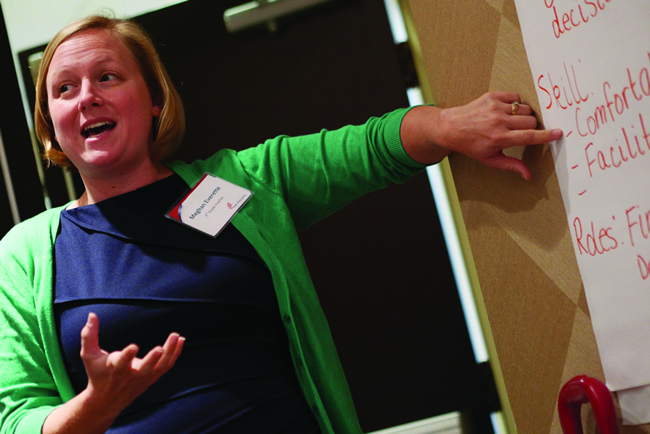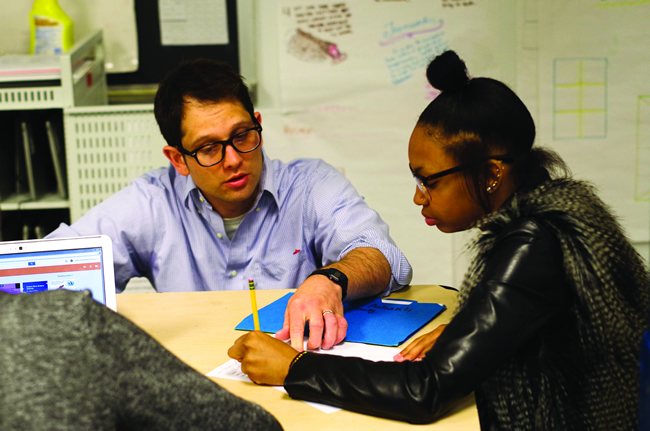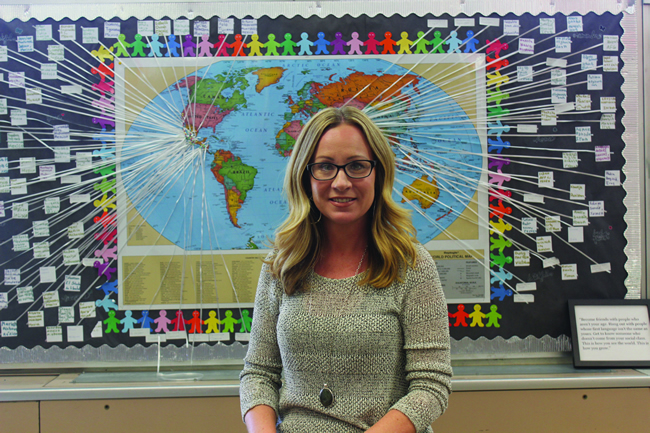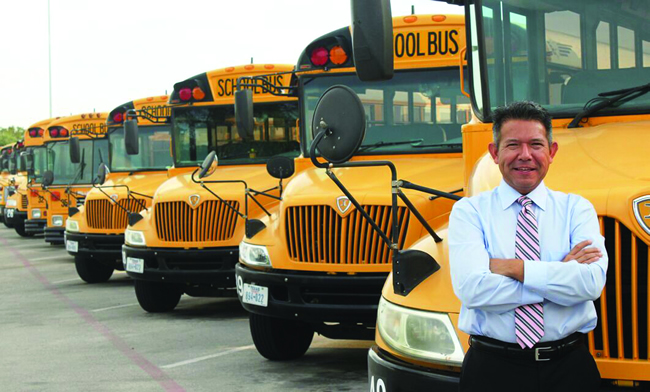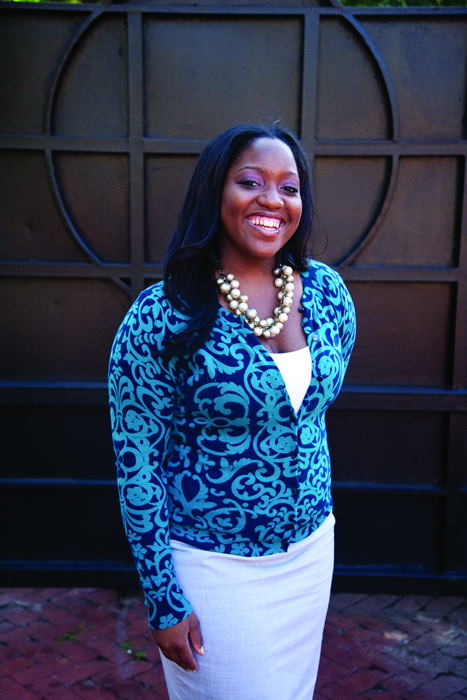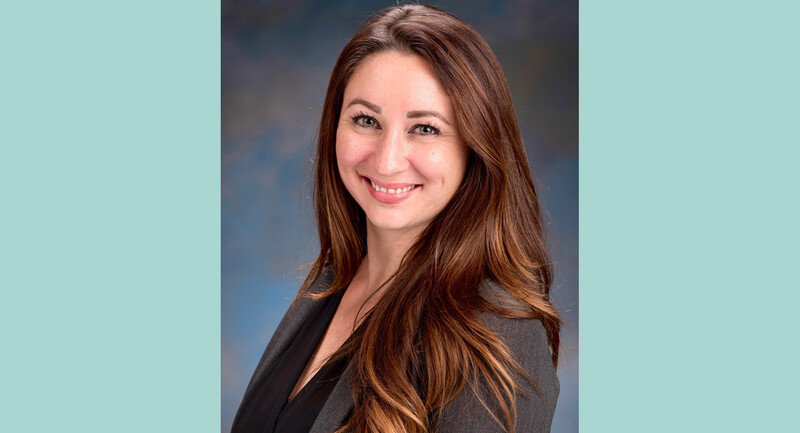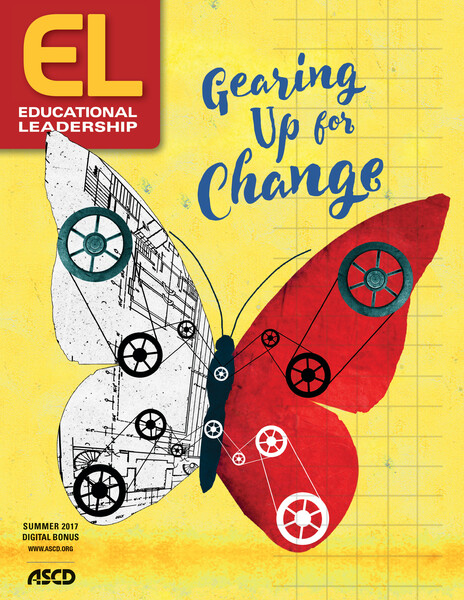From local school board meetings to federal congressional offices, teachers are making their voices heard about policy decisions that affect their students and schools. Teacher advocates always play an important role in speaking on behalf of the profession, of course, but their work is especially vital when administrations and policies shift during times of change. We spoke with five teacher advocates, each with his or her own passions and policy interests, about how they're gearing up for—and influencing—today's changes in education.
Meghan Everette
Figure
Photo courtesy of Meghan Everette/Photo by Sam Levitan
January 24, 2017 wasn't an ordinary day for education policy advocates. It was just a few days after President Trump's inauguration and a week after now-U.S. Secretary of Education Betsy DeVos's contentious confirmation hearing—one that led many educators and parents to pay close attention to federal education policy, in some cases for the first time. The phones in federal congressional offices rang off the hook as citizens tried (often unsuccessfully) to reach their elected officials to register their thoughts about DeVos.
Meghan Everette, a K–6 math teacher on special assignment from Salt Lake City, Utah, wasn't on the phone. She sat in the offices of Utah's senators and representatives on Capitol Hill, speaking with staffers about the importance of funding whole child initiatives, the work she's doing to help improve teacher preparation, her interest in Utah's plan to implement the Every Student Succeeds Act (ESSA), and her concerns about DeVos' nomination. She has made about half a dozen such trips to Washington, D.C., over the past four years. (On this occasion, her visit was part of ASCD's Leadership Institute for Legislative Advocacy conference.) How Everette has gained regular access to those congressional offices is a story that's closely linked to her professional evolution. When Everette was an early-career teacher, one of her first principals provided opportunities for educators to get involved in areas they were passionate about, including policy. Later, in 2013, Everette was named Elementary Teacher of the Year for Alabama (where she lived at the time) and had the chance to work with the U.S. Department of Education on whole child education.
In 2015, she was named a National Teaching Fellow with the nonprofit, nonpartisan Hope Street Group. In collaboration with Hope Street and the Department of Education, Everette recently contributed to a report about teacher preparation programs and issues around professional development and mentoring. Everette believes that no matter how active she is in policy advocacy, she'll make a greater impact if she can engage more educators in this work. For this reason, in 2016, she began working with a team of fellow educators on a project with Teach to Lead (a teacher leadership initiative facilitated by the National Board for Professional Teaching Standards, ASCD, and the U.S. Department of Education). The team surveyed more than 500 educators to find out how and why they got involved in policy and what keeps them active. "What are the motivators and barriers?" Everette asked. "We're looking at teacher prep as well. Are teachers set up to do this work?" Moving forward, Everette's Teach to Lead team plans to hold events aimed at building and sustaining educator advocates. "The goal is to get more teachers talking, educated, and then active in some way," she said. She knows that public education needs more teachers like herself to share their passions and perspectives with their elected officials in Washington.
John Troutman McCrann
Figure
Photo courtesy of John Troutman McCrann/Photo by Mary Conroy Almada
"Many people can deliver better political speeches [than I can], but a lot of them didn't spend last Tuesday working with a 9th grader who can't solve a linear equation," said John Troutman McCrann, a teacher of algebra, geometry, and physics at Harvest Collegiate High School in New York City. "That kind of knowledge gained from working in classrooms has to be the most important factor in discussions about education policy."
Early in his career, McCrann realized that classroom-based knowledge wasn't valued enough. Too many policy decisions seemed to be handed down by district administrators or state and federal officials who didn't understand the work of schools. "I'd find myself in a teacher workroom trying to figure out why they were doing this," he said.
Fast-forward 11 years and McCrann now finds himself teaching at Harvest Collegiate, a school that has flipped at least part of the customary education decision-making structure on its head. Through an agreement between New York City and the United Federation of Teachers (of which McCrann is a union chapter leader), educators at the school have the opportunity to redesign certain aspects of the school (such as scheduling) that aren't typically allowed under the union's standard contract. "It doesn't mean all [our] policies are great, but it does mean that instead of asking why they are doing this to us, we ask why we're choosing to do this," McCrann said.
Empowered by his school's recognition of teacher expertise, McCrann has become a vocal advocate for performance-based assessment. He describes his stance as "pro-assessment and anti-test," noting that evidence of student learning "should come from assessments that make sense in the context [that students are in]." He has helped develop the math and science assessments his students take in lieu of the state's standardized exams as part of his school's participation in the New York Performance Standards Consortium. He traveled to Albany to talk about expanding performance-based assessment, and he's met with Randi Weingarten, president of the American Federation of Teachers, about how New York could pilot different types of assessments under ESSA. McCrann has also completed a two-year residency with America Achieves, a nonprofit organization that helps educators accelerate their ideas and initiatives to improve outcomes for students. Through the program, he made connections "all over the edu-political map," he said—pointing to the importance of gaining exposure to viewpoints that are different from his own. McCrann believes that many teachers are used to being given parameters and doing the best job possible for their students within those limits. "At this point in my career, I am not only working within those parameters, but also looking at how I can move the parameters in a way that's going to help my students learn," he said.
Lindsey Bird
Figure
Photo courtesy of Lindsey Bird/Photo by Kameron Lillibridge
Lindsey Bird's passion for helping immigrant, refugee, and asylum-seeking students started when she was hired by Modesto City Schools in 2004. Located in California's agricultural Central Valley, the district serves a diverse population of students. Bird's students come not only from Spanish-speaking nations but also from the Middle East because Modesto has become a hub of refugee resettlement in the past decade.
Bird's first assignment was teaching high school history to English language learners. Her students fell along all points of the language-acquisition continuum, and she found it difficult to deliver individualized instruction. School officials told her that after she paid her dues, the school would give these challenging classes to a newly hired teacher. "I witnessed the injustice of putting kids in a classroom environment that wasn't conducive to their needs," she said. "These kids deserve the best, not teachers who are paying their dues." These students were her passion, Bird told the school, and she wanted to continue working with them.
In 2009, she helped found the district's Language Institute, a program that provides targeted instruction to approximately 280 teenagers at the beginning stages of English language acquisition. But at the end of that school year, amid a state budget crisis, Bird received a pink slip. It wasn't because she was an ineffective teacher or lacked passion by any means, but because of the state's "last-in, first-out" layoff policy. She was again struck by the sense that a common school practice was not in the best interests of the most vulnerable students. Ultimately, the Institute's coordinator decided to retire, allowing Bird to take the reins while also serving as a geography teacher—positions she continues to hold today.
Following these experiences, Bird became involved with Teach Plus, an organization that supports teacher leaders as they advance changes to better serve high-needs students. Through her work with Teach Plus, Bird has connected with other educator advocates and shared her ideas with local representatives. She also met with former U.S. Secretary of Education John King about the needs of refugee students. At the state level, Bird hopes to influence changes to seniority rules and tenure—a difficult task considering California's long-standing labor laws for teachers. The state grants tenure after a teacher has been in the classroom for two years. "Maybe we're letting go of great teachers who haven't had the support they deserve or maybe we're being forced by the current teacher shortage to keep teachers who don't deserve that professional distinction," she said. Bird isn't advocating for the abolishment of tenure, but rather for changes to existing rules, such as adding an extra year to the process.
She's quick to point out that she's a union member and isn't against job protections. "As an advocate for these students, if I didn't have the protections my union grants me and the ability to disagree with my district, I might not have a job," she acknowledged. "But how can we balance these rules in a way that best serves students, particularly those disenfranchised by the status quo?"
"Even though it's a lot of work outside the classroom, I think it's a long-term investment," Bird, now in her 13th year of teaching, said of her advocacy roles. "How frustrating it would be to work in a profession where you know things could be better, but to not see the light at the end of the tunnel. It recharges my battery to be chipping away at the solution."
José Rodríguez
Figure
Photo courtesy of José Rodríguez/Photo by Paulette Rodríguez
More than two decades into his teaching career, José Rodríguez has seen changes come and go. The ESL teacher at Pleasant Hill Elementary in Leander, Texas, first realized how policy decisions in a distant place could affect his classroom when No Child Left Behind was signed into law in 2001. He started to hear rumblings about teacher evaluations and student data and wondered how politics and policy would influence his practice and his students. "What are the feds up to, and what will be added to my plate as a teacher?" he asked himself. These were some of the questions that lead him into the policy world—with the goal of making sure that teachers' voices are heard when decisions are made.
Rodríguez wasn't exactly a stranger to policy. He holds an undergraduate degree in government (he came to teaching after serving as a U.S. Marine and working as an urban planner) and also completed a master's degree in public policy. Because of this background and his teaching experience, he was selected to serve as a Teaching Ambassador Fellow at the U.S. Department of Education in Washington, D.C., in 2009. During this yearlong fellowship, he shared his classroom expertise with policy makers and connected with education advocates around the country.
Although Rodríguez's formal role with the U.S. Department of Education ended several years ago, there's a physical token of his passion for the teaching profession at the department's headquarters near the National Mall. Along with then-U.S. Secretary of Education Arne Duncan and students from a local school, Rodríguez planted an oak tree (the department's symbol) on the west side of the building. "Washington is beautiful and has lots of memorials and monuments, but most are made of marble or concrete," he said. "I wanted a living memorial to teachers around the country who do this work every day."
These days, you'll find Rodríguez amplifying teacher voices around one of the latest changes to the education policy landscape—ESSA. Working with Teach Plus and a group of fellow Texas educators, Rodríguez organizes roundtable discussions to gather information and listen to teachers' concerns about how ESSA will affect their work. His group will share its findings with the Texas Education Agency.
"We need teacher practitioners to have a seat at the table at all levels of decision making—at the campus, district, regional, state, and national level," he said. "We not only need to join in, but sometimes we need to set the table and send invitations."
Kayla Morse
Figure
Photo courtesy of Kayla Morse/Photo by Shannon Kalahar
By Kayla Morse's estimate, half of her students at Oliver Wendell Holmes Elementary in Boston have experienced trauma. The inclusion teacher says that many of her students' families have self-reported cases of abuse, domestic violence, homelessness, and drug addiction. In their first decade of life, some of her students have witnessed acts of extreme violence or had family members imprisoned. Still, when they arrive at school each morning, they're expected to learn.
Moved by her students' plight, Morse became interested not only in identifying best practices for trauma-sensitive schools, but also in delivering trauma-sensitive instruction, particularly in math. "It's not just social-emotional learning. It's how you deliver academic content through a social-emotional lens," she said.
Morse realized that increasing her own knowledge would be key, so she took classes on neurological research related to trauma. Then, in February 2016, she became a Zeroing in on Math Fellow with EdVestors, an organization that seeks to accelerate improvement in Boston's schools. During the yearlong fellowship, Morse and like-minded educators learned from experts and worked to address challenges in math achievement. Specifically, Morse and three other educators focused on how teachers can establish a "culture of math" that engages all learners. Later that year, Morse joined Educators for Excellence, a national group focused on making sure that teachers voices are heard in policy decisions. Together with an action team of five other Boston educators, Morse published recommendations to help her state and local districts design teaching and learning with social-emotional practices in mind. The recommendations fall into three main categories—deepening practitioner competencies, cultivating trauma-informed communities, and reinforcing schools with resources. The team's suggestions for the state include establishing a minimum school counselor-to-student ratio of 1:250 and a school psychologist-to-student ratio of 1:700, as well as creating a school funding structure that is responsive to the growing costs of educating vulnerable student populations. With five years of teaching experience, Morse is still considered an early-career educator, but that hasn't stopped her from meeting with state representatives to talk about education and social justice or sharing her work in town-hall settings with district officials, including Boston's superintendent.
"Transformation can happen in the classroom, but it can also happen on a broader scale with advocacy," she said. "What keeps you up at night? What perplexes you or gets you stuck? Listen to that and follow it."
Resources for Educator Advocacy
➜ Watch ASCD's ESSA webinar series to learn about testing, accountability, professional development, and school improvement under the new law.
➜ Follow Education Week's for the latest developments in federal education policy.
➜ Submit a project to Teach to Lead to bring about change in your school or for the teaching profession.
➜ Take part in the Cage-Busting Teacher" online course, created by Frederick M. Hess at the American Enterprise Institute, to learn how to become a change agent.
